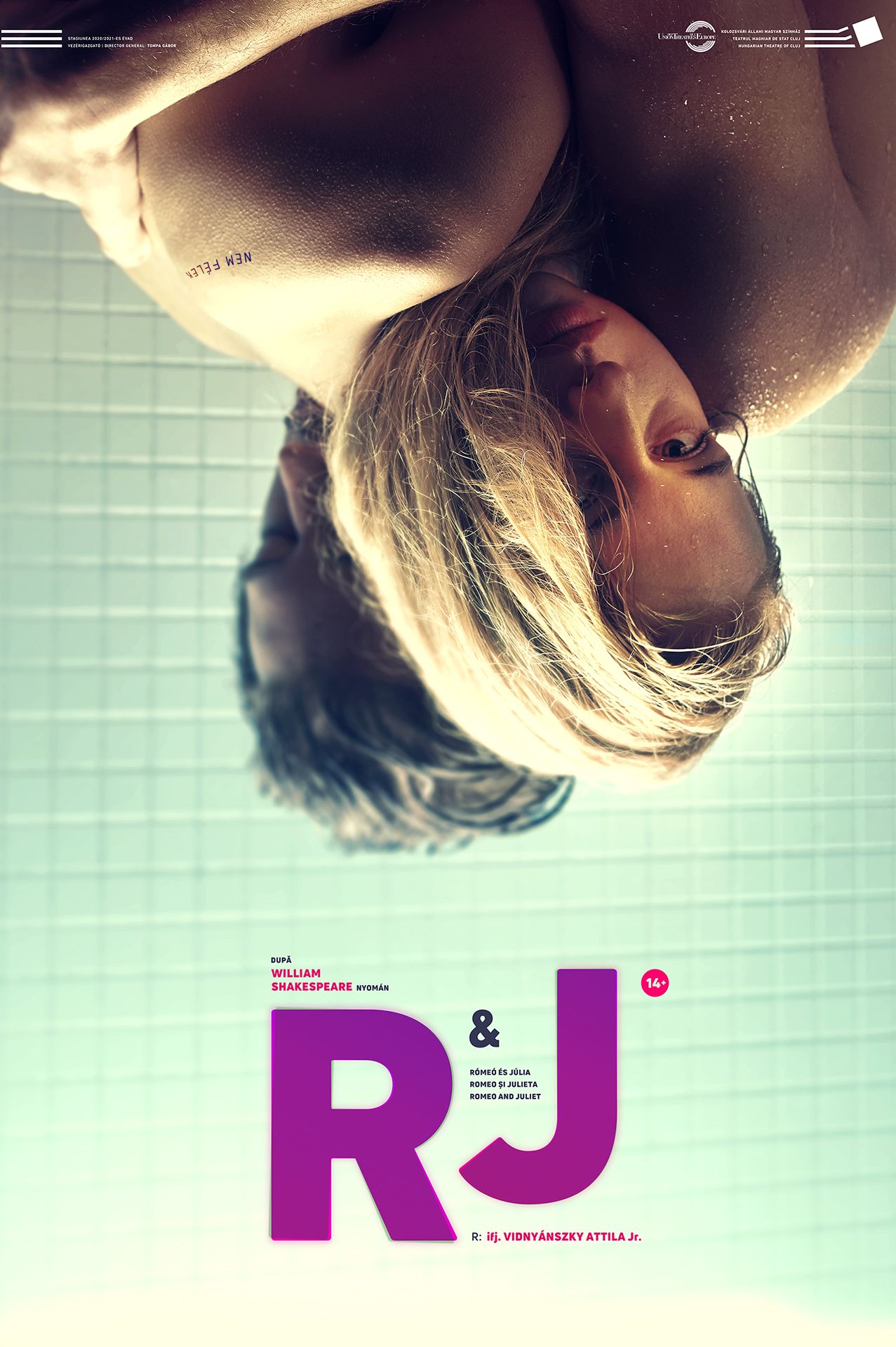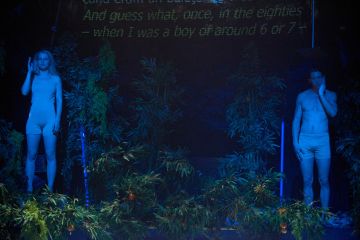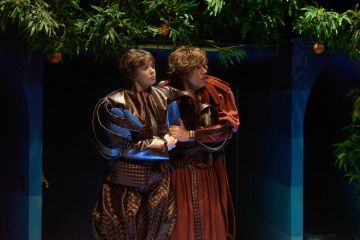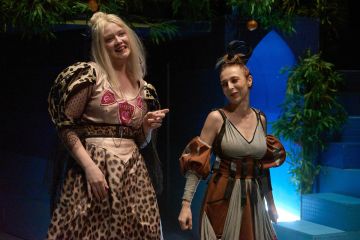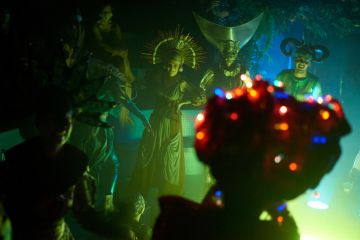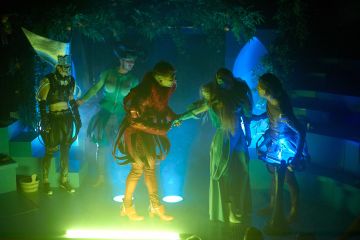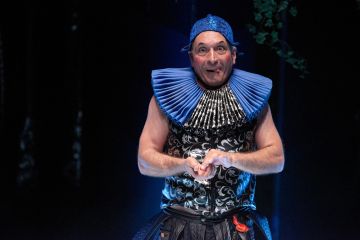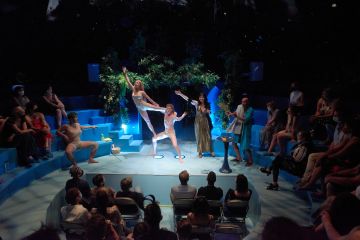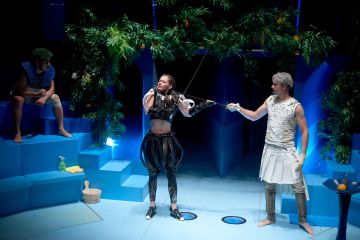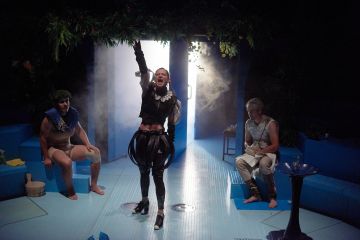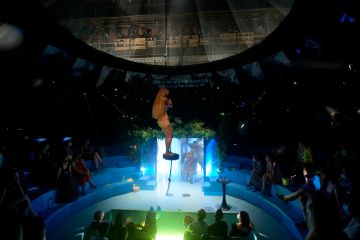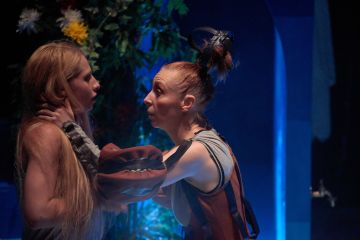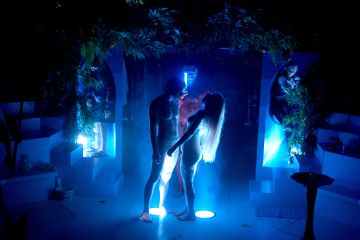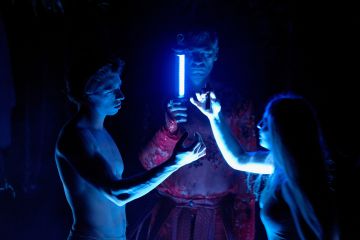A very dynamic show, and quite bewildering, since it involves the audience in a direct relationship with the characters – feedback is requested, and a response, expected from the „public” –, and disarmingly sincere. An unexpected amount of improvisation for a text written by Shakespeare! Some scenes are in the clef of commedia dell’arte, and others, in that of Stanislavsky – a lot of work was done with each individual actor, and it shows in the details. Attila Vidnyánszky Jr. put a lot of thought in the casting, so that the maturity of the members of the two families blend perfectly with the youthfulness of the two lovers, joined by Benvolio. Incidentally, Gedő Zsolt sometimes makes Benvolio into a court jester, at other times, into a sort of circus clown performing his act to the tee, and yet again into the host of the show, at these times creating seamless dialogue with Herceg. What further stands out is the candour of Juliet (you’ll be hearing about Román Eszter, I can just see her at home in a Chekhov piece), the incredible youthfulness of Romeo (Kiss Tamás), the dedication of the nurse (Albert Csilla), and the lowliness/cunning of the friar (Bogdán Zsolt). The Capulet – Montague tandem gain consistency and intrinsic artistic value through the manner in which the two – Kézdi Imola and Szűcs Ervin – manage to juggle the character traits as well as their costumes. Neither is Paris – Farkas Loránd – to be ignored, sneakily inserting his character into the story with a matter-of-factness worthy of the most famous plots in history.
Nona Rapotan: Despre dragoste la superlativ – „Romeo și Julieta” în secolul XXI [About love, in the superlative – Romeo and Juliet in the 21st century], bookhub.ro, 11 July 2021
Romeo and Juliet prepare to leap to their deaths. It’s all been decided, the antagonistic families do nothing but unfold their bizarre machinations of opposition. Memory fails, the lines get botched, and they try to compose themselves with no success. Those who feel they are immune to wordplay is happier that they might think. The torrid atmosphere forbids any torpor, since attention is put to a great test by incisive series of premeditated surges and ambushes. You’re forbidden from not paying attention to all that goes on; there’s much too much happening, the costumes are explosively gorgeous, I’d love to try each and every one of them myself. A fascinating gaggle of rogues try to entice us. Viewer, fascinating is thy placidity, if you can still afford it. Well, yeah, I allowed myself a treat, as a spy at the ball.
Ana Ionesei: „Romeo și Julieta”: Curiozitățile naturii umane [Romeo and Juliet: the curiosities of human nature], bookhub.ro, 14 July 2021
We are treated yet again to excellent performances by the Cluj actors; one example would be the breathtaking characterisations offered by the duo of Kézdi Imola–Szűcs Ervin playing the Capulet/Montague couples. The rest of the cast – featuring Albert Csilla in the role of the Nurse, Bogdán Zsolt as Friar Laurence, Farkas Loránd as Paris as well as Bodolai Balázs as Tybalt – provide equally memorable moments. At the beginning, it might be somewhat strange that Mercutio (Imre Éva) is a lady, and that Benvolio (Gedő Zsolt) has breasts, but if we consider that in Shakespeare’s time, Juliet was also played by men, the ‘gender-bending’ doesn’t seem that much out of place. As to the two protagonists, Romeo and Juliet: two of the company’s newest, young and talented artists, Román Eszter and Kiss Tamás portray their characters with youthful grace and freshness.
(…)
If we set aside our prejudices and expect no classical means of theatrical expression; in other words, if we are open and accepting to the new, we will greatly enjoy the show directed by Vidnyánszky Attila Jr. A new artistic voice which aims not to scandalise the audience, yet still manages to create a singular show within the limits of good taste. Which might even be a better fit to our current era, where sometimes nothing is as it seems.
Nánó Csaba: Az örök szerelmespár története új köntösben [The story of the ubiquitous lovers, reimagined], erdelyinaplo.ro, 18 July 2021
It is not answers the show serves up, but grotesque scenes, live music, a tour de force in acting, superb punchlines, lyricism, laughter and vicious gut-punches. Eclectic costumes sometimes reminiscent of a clown’s getup, as well as the witty and poignant choreography completes the picture. There is a peculiar sort of grandeur enveloping it all that I can’t quite unravel, and I won’t; this is theatre, excellent theatre, and of course it will enthral.
And oh, does it ever in the triumph of acting displayed by the actors, as they switch from grotesque to lyrical, from comedy to drama and back. With a well-placed emphasis, glance, gesture and motion, they succeed in telling entire stories. Kézdi Imola delivers a trophy wife’s affectations, and subsides into the silence of all women defeated; Szűcs Ervin’s Capulet believes himself strong because he gives commands; Albert Csilla’s buoyant Nurse becomes offended from time to time, and is irresistible. Váta Lóránd’s pure comedy, Imre Éva’s vibrant Mercutio, Farka Lóránd’s (Paris) colours and tones, Bodolai Balázs’s (Tybalt) conceit, Bogdán Zsolt’s shifty Friar Laurence, Gedő Zsolt’s (Benvolio) portrayal of a multitude of colours and voices, Kiss Tamás’s (Romeo) adolescent charm and earnest rendition, Román Eszter’s vulnerable sincerity are all on the mark. The Cluj-Napoca actors’ fame is well earned; only with them could this grotesque contemporary show be staged authentically. And so could much more, I might add. Román Eszter, Kiss Tamás and Gedő Zsolt are newcomers to the theatre, and this is their first opening. They’re beautiful, young and talented. They’re a perfect fit for this extraordinary company.
Judit Simon: A peculiar sort of grandeur [Valami furcsa pompa], ujvarad.ro, 14 September 2021
Bodolai Balázs gives a memorable performance as Tybalt; his scene as the Apothecary has the audience rolling in the aisles, and Szűcs Ervin’s Capulet gets much the same reaction as he lets it all hang out as Capulet. Breaking with long-standing tradition, Albert Csilla portrays a youthful Nurse, while Kézdi Imola as Lady Capulet wavers slightly, sometimes entertaining, at other times – as she is quick to point out – “too much”; though in the end, this is what the director asked for. Romeo’s friends offer up excellent satire; Gedő Zsolt and Imre Éva also stand out in the frenzied choreography (stage movement: Sinkó Ferenc). The characters of Paris (Farkas Loránd) and Friar Laurence (Bogdán Zsolt) are less prominent, yet they too are valuable inhabitants of this extravagantly dressed (costume design: Kiss Zsuzsánna), exuberant world.
Emma Rosznáky Varga : Love Synchronicity [Szerelemszinkron], art7.hu, 23 September 2021
A mise-en-scène may become more relevant if it deconstructs the classics and adapts them loosely rather than striving to be faithful to the text. Romeo and Juliet as set to the stage by the Cluj theatre might be a good example of that. It captured contemporary reality and unveiled to us a nicely packaged and somewhat kitschy version of it. Case in point: the universe of vernacular language is mixed with elements from the classical text (the production uses Mészöly Dezső’s translation) framed by embellished grandeur (when it comes to the costumes). And this world is surrounded by a Hungarian “shroud” as well, which envelops the entire show and is ever-present. By this, I mean that the Hungarian folk songs sprinkled throughout the show create a particular universe of emotion in the viewer.
Réka Fazakas – Kriszta Kedves: What’s a Classic Do in the Pool? [Mit csinál egy klasszikus a medencében?], szinhaz.net, 08 October 2021
It is a performance in which several generations of actors meet, some of them at their first performance at the Hungarian Theatre of Cluj, an experience that the director considered unique, in no way ignoring the generation gap. A cohesion that was reflected in the entire construction of the show, which Attila Vidnyánszky Jr. built around the actor: "I strive to make the show revolve around the actor. I want to believe in actors".
Silvia Dumitrache: Întîlnire 2.0 cu Shakespeare, Orwell, Ionesco și Cehov [Encounter 2.0 with Shakespeare, Orwell, Ionesco and Chekhov], observatorcultural.ro, December 16, 2021
The Dance & Lights (the Éva Imre (Mercutio) moment before intermission should be studied & savored in every dance studio, theatre company, dream space in this country, continent and world)
And it will go on for 3 hours and long after that, into night, into dream, the imagination, etc., inviting us to shed / pass on roles, personalities, genres, preferences, quirks, obsessions, affiliations, fanaticisms, to produce an hour, a scene, a gesture, a glimpse of a different world. Sounds utopian? Check out R&J and we'll talk after.
Mihai Brezeanu: Reunirea circurilor de la Budapesta și București / The joint future of theatre - Rómeó és Júlia / Romeo și Julieta [The reunion of the Budapest and Bucharest circuses / The joint future of theatre - Rómeó és Júlia / Romeo and Juliet], liternet.ro, December 2021
Imola Kézdi and Ervin Szűcs, who play both sets of parents, are almost bursting with humor, they really do play around with the overly exaggerated figures, constantly producing gags. In general, the production is characterized by good acting, with lovable characters populating the narrow amphitheater-like space.
Kata Köllő: Rómeó és Júliával a geg nyomában [In the footsteps of gag with Romeo and Juliet], Játéktér, 2021/fall, Year 10, No. 3












